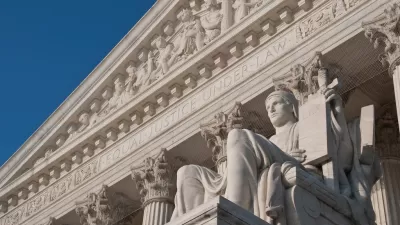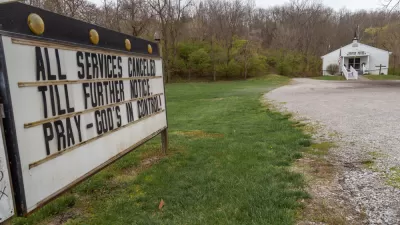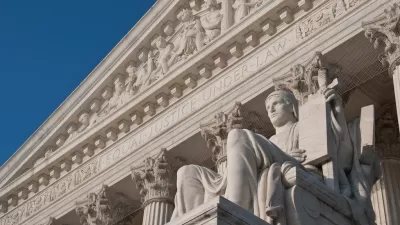In a late-night 5-4 ruling on the eve of Thanksgiving, the U.S. Supreme Court ruled that a governor's executive order to stem the spread of a contagious virus can not impede the right of people to gather in a church.

"The Supreme Court late Wednesday night granted requests from the Roman Catholic Diocese of Brooklyn and two Orthodox Jewish synagogues to block enforcement of a New York executive order restricting attendance at houses of worship," reports Amy Howe for SCOTUSblog on Nov. 26.
The ruling, which applies only to New York, essentially reverses a 5-4 decision on May 29 of a similar California coronavirus restriction and highlights the significance of the newest justice, Amy Coney Barrett, who replaced Justice Ruth Bader Ginsburg who died in September.
Both the diocese and the synagogues claimed that the executive order violated the right to the free exercise of religion guaranteed by the First Amendment, particularly when secular businesses in the area are allowed to remain open.
Five conservative justices – Clarence Thomas, Samuel Alito, Neil Gorsuch, Brett Kavanaugh and Barrett – sided with the religious groups and blocked the attendance limits. Chief Justice John Roberts, along with Justices Stephen Breyer, Sonia Sotomayor and Elena Kagan, dissented.
All opinions, including the majority, which was unsigned, and dissenting ones from individual justices, can be found in the 33-page decision entitled, Roman Catholic Diocese of Brooklyn v. Cuomo [pdf] that also applies to the synagogues’ case [pdf].
"Members of this court are not public health experts, and we should respect the judgment of those with special expertise and responsibility in this area. But even in a pandemic, the constitution cannot be put away and forgotten. The restrictions at issue here, by effectively barring many from attending religious services, strike at the very heart of the first amendment’s guarantee of religious liberty,” the opinion said.
"In a fiery dissent, Justice Sonia Sotomayor said the court’s decision to block COVID-19 restrictions on religious gatherings 'will only exacerbate the nation’s suffering,'” reports Sarah Ruiz-Grossman for HuffPost.
“Justices of this Court play a deadly game in second guessing the expert judgment of health officials about the environments in which a contagious virus, now infecting a million Americans each week, spreads most easily,” Sotomayor wrote in her dissent.
"The American Civil Liberties Union [ACLU] condemned the decision and warned it could 'undermine New York's efforts to curb the pandemic,'" reports David Aaro for Fox News.
“New York’s temporary restrictions on indoor gatherings do not discriminate against houses of worship, and, in fact, treat them better than comparable non-religious gatherings," said Donna Lieberman, executive director of the New York Civil Liberties Union. "The Supreme Court's decision will unfortunately undermine New York’s efforts to curb the pandemic.”
The Roman Catholic Diocese of Brooklyn cheered the decision, reports Lia Eustachewich for the New York Post.
In his statement Thursday, [Nicholas DiMarzio, the Bishop of Brooklyn] blasted the safety precautions as “an overreach that did not take into account the size of our churches or the safety protocols that have kept parishioners safe.”
Church gatherings have been linked to super-spreading events. In an undated survey by CivicMeter of 27 epidemiologists, "indoor theaters/churches" were listed just behind jails/prisons, bars, and nursing homes as places of highest risk from coronavirus infection.
Marcia Coyle reported on the PBS NewsHour that the Supreme Court has two applications by religious institutions for injunctions of coronavirus restrictions, including one from California which set a national record for the most daily coronavirus infections, 18,350, on Wednesday (the cases were recorded on Nov. 24 according to the California Department of Public Health).
Emergency medicine physician, Dr. Dara Kass, speaking from a public health perspective, worried that the decision removed the ability of mayors and governors "to make decisions that impact their community as little as possible while protecting their citizens from the virus."
The last word goes to Dr. Celine Gounder of the NYU Grossman School of Medicine and who serves on the Biden-Harris Transition team's COVID-19 Advisory Board.
"I do think we have seen that churches, synagogues, and other places of worship, have been sites of transmission," she told CBS News on Friday.
There are ways to practice your religion safely. Some houses of worship have moved their services online; others have done so outside.
I don't think it should have to be either your religion and your religious freedom vs. public health. There are ways we can do both.
For additional reading, see Robert Barnes's piece in The Washington Post and coverage in NPR by Nina Totenberg and Jaclyn Diaz.
Related in Planetizen:
-
Amy Coney Barrett's Only Property Rights Ruling, Careful, Narrow, Deferential, September 28, 2020
FULL STORY: Justices lift New York’s COVID-related attendance limits on worship services

Planetizen Federal Action Tracker
A weekly monitor of how Trump’s orders and actions are impacting planners and planning in America.

Maui's Vacation Rental Debate Turns Ugly
Verbal attacks, misinformation campaigns and fistfights plague a high-stakes debate to convert thousands of vacation rentals into long-term housing.

Restaurant Patios Were a Pandemic Win — Why Were They so Hard to Keep?
Social distancing requirements and changes in travel patterns prompted cities to pilot new uses for street and sidewalk space. Then it got complicated.

In California Battle of Housing vs. Environment, Housing Just Won
A new state law significantly limits the power of CEQA, an environmental review law that served as a powerful tool for blocking new development.

Boulder Eliminates Parking Minimums Citywide
Officials estimate the cost of building a single underground parking space at up to $100,000.

Orange County, Florida Adopts Largest US “Sprawl Repair” Code
The ‘Orange Code’ seeks to rectify decades of sprawl-inducing, car-oriented development.
Urban Design for Planners 1: Software Tools
This six-course series explores essential urban design concepts using open source software and equips planners with the tools they need to participate fully in the urban design process.
Planning for Universal Design
Learn the tools for implementing Universal Design in planning regulations.
Heyer Gruel & Associates PA
JM Goldson LLC
Custer County Colorado
City of Camden Redevelopment Agency
City of Astoria
Transportation Research & Education Center (TREC) at Portland State University
Jefferson Parish Government
Camden Redevelopment Agency
City of Claremont





























